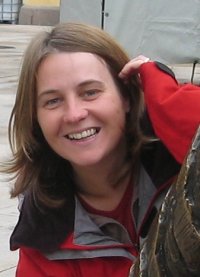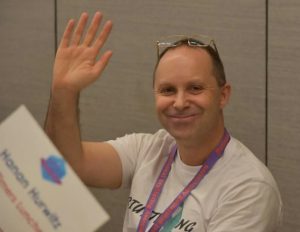 About the authors: Jenny Packer About the authors: Jenny Packer
Jenny Packer is a Speech and Language Therapist working for the National Health Service in the United Kingdom. She works with adults and children who stutter and in addition to her clinical work, is currently co-chair of the International Fluency Association’s Meetings and Conferences committee. |
 About the authors: Kirsten Howells About the authors: Kirsten Howells
Kirsten stutters and is a UK-educated Speech and Language Therapist. She has spent a number of years living in Norway, and has recently moved to California. She is co-chair of the International Fluency Association’s Meetings and Conferences Committee, and has recently joined the San Jose chapter of the NSA. |
 About the authors: Hanan Hurwitz About the authors: Hanan Hurwitz
Hanan Hurwitz is an electronics engineer, working at a company in Israel that designs and manufactures electronic servo controls. He is currently employed as Director of Quality, and has extensive experience in diverse disciplines, from Product Development through to Business Processes and Quality Management. Hanan has stuttered since childhood. He started his journey of understanding stuttering in 2010, when he attended the National Stuttering Association annual conference. At that conference he learned key concepts about stuttering. Knowledge about stuttering and meeting so many wonderful People Who Stutter, have enabled him to come back from deep despair, and to grow and thrive. After being helped by the stuttering community, Hanan is working to give back to the community and to support other People Who Stutter. |
Some within the stuttering community perceive historical divisions between people who stutter and professionals researching or working clinically within the stuttering world. For some, these groups may appear to occupy different ‘camps’ and hold different views about and attitudes towards stuttering. Others, however, are involved with initiatives where these groups cooperate well, exploring experiences of, feelings about, and attitudes towards stuttering.
A new initiative is underway, with the International Fluency Association (IFA) and the International Stuttering Association (ISA) working together to create a shared World Congress for 2018 in Hiroshima, Japan. Dates have not yet been finalized, but the event will probably take place in July or August. This will be a unique event, as the two organisations have not previously held a joint World Congress, but we hope it will be one which brings different aspects of the stuttering community together, sharing perspectives and insights, enthusing and inspiring one another. We feel it is important to stress that the IFA does not promote ‘fluency’ as a goal, but rather the IFA is “devoted to the understanding and management of fluency disorders, and to the improvement in the quality of life for persons with fluency disorders.” It is based on this clarification and understanding that a joint conference was proposed and accepted. The International Cluttering Association (ICA) will also join this collaboration, creating opportunities to discover similarities and differences in experiences for those who stutter and those who clutter – or both. It is sincerely hoped that this event will allow for a true celebration of stuttering and cluttering, building on the themes of the 2016 International Stuttering Awareness Day Online Conference – respect, dignity, recognition, and pride.
Planning a new World Congress is very exciting, and challenging! The Congress Organising Team includes representatives from all three of the international associations involved, as well as members of the Japanese host team. Still in the early planning phases, we are considering ways to ensure that the congress in Hiroshima will be an event that appeals to all within our shared community. Ideas so far include karaoke, open mic sessions, panel discussions and debates, in addition to workshops and scientific presentations. Our priorities are to ensure we create a worthwhile, accessible and affordable event that will allow everyone attending to feel welcomed, included and valued. We want people who stutter or clutter to feel safe and surrounded by friends. We want those who work clinically to have opportunities to share and update their skills. We want to give researchers an opportunity to present high-quality research in a stimulating environment, while simultaneously giving those who explore innovative and new approaches to living with stuttering a chance to share their experiences and ideas. Presenters will be encouraged to present their work and ideas in ways that are understandable for all delegates. The opportunity to inspire new research relevant to our community is also important. We are aiming to break down some of the barriers that can exist among these groups, encouraging mutual respect and recognition of the different pieces of the puzzle that different backgrounds and experiences can offer. Critically, it is our belief that worthwhile advances in quality of life and advocacy for those living with fluency disorders can only occur in the context of open dialogue and mutual respectful exchange among people who stutter or clutter, therapists seeking to help, and researchers seeking to understand the nature and best treatment of fluency disorders.
While the organising team has many ideas about how to create an exciting and interesting World Congress, we are very interested to hear from the wider community. What is important for you in a World Congress? What sort of sessions and discussions would make you interested in attending? Are there any elements that would NOT interest you or would make you NOT want to attend? Please add any thoughts or suggestions in the comments section below as we really want Hiroshima 2018 to be an event that appeals to as many people as possible. We can’t promise to include everything suggested, but we will do our best to consider all possibilities!
A final thought – we are talking about the best language to use when discussing stuttering and different people within its community. So many different terms are used which can unintentionally upset, offend or frustrate people, often dependent on who is speaking. For example, terms such as ‘people who stutter’, ‘PWS’ and ‘consumers’ may be regarded positively or negatively dependent on the context. Similarly, ‘professionals’, ‘therapists’ and ‘researchers’ often hold different meanings for different people. We want to ensure that the language used during both the planning phase and within the congress itself, reflects the most appropriate terms possible. We would, again, be interested to hear from you in order to gain as many views as possible. Please send in your suggestions or comments on this emotive issue.
Keep an eye on the ISA, IFA and ICA websites, Facebook and Twitter accounts as dates for the joint World Congress will be announced soon (see below for links). We hope that you will be as excited as we are about the conference. Hiroshima 2018 promises to be a wonderful event – we hope to see you there!
International Fluency Association
- Website: http://www.theifa.org/en/
- Facebook: https://www.facebook.com/InternationalFluencyAssociation/
- Twitter feed: @official_ifa
International Stuttering Association
- Website: http://www.isastutter.org/
- Facebook: https://www.facebook.com/ISAStutter/
- Twitter feed: @ISAStutter
International Cluttering Association
This paper is submitted by Hanan Hurwitz, Jenny Packer and Kirsten Howells, on behalf of the 2018 World Congress Organising Team.
![]()

Exciting collaboration! Wishing you all, including the three International organizations, the best for the coming planning preparations I am looking forward to follow the websites and Twitter accounts, and to join the Congress in Hiroshima in 2018! Best wishes from Hilda in Oslo, Norway
Thank you to all three of you for collaborating on this paper and representing the collaboration that is going into the WC 2018. It’s so reassuring to hear and read that so many efforts are in place now to ensure a very successful World Congress. I’m interested in what you write about language. I believe English will be the official language at the Congress, yes? Will there be interpreters provided for the Japanese who do not speak English? -Pam
Hi Pam. The primary language of the Congress will be English. However, we are aware that this may reduce the Congress’ accessibility to many local (Japanese) attendees. Simultaneous translation for all sessions is not feasible, and so we are still working to find the best compromise to balance cost and accessibility.
Thank you for collaborating to create a shared World Congress! I appreciate you asking readers for input on discussions. A topic I am particularly interested in is how speech-language pathologists can better serve and advocate for their clients and their family members.
How many individuals would be able to attend the World Congress?
What has been the most rewarding part about collaborating together to create the World Congress 2018?
Hi. Many thanks for your comments and suggestion regarding topics for the congress. We will take them back to our organising team.
At the moment, we are predicting 350-450 attendees and making arrangements based on these predictions. It is, however, difficult to know how many attendees to expect, as the three international organisations have not held a congress in Japan before.
Regarding the collaboration itself, we are still in the early stages but, personally, I’m having a blast. The Congress Organising Team is composed of individuals who are passionate about stuttering and cluttering, and are committed to the challenge of making this ambitious congress happen, bringing the three international associations, the stuttering associations of Japan, and researchers, clinicians and people who stutter or clutter together. The passion is infectious. There are so many ideas flying about, it’s inspiring and exciting to be a part of it all. Now we need to harness the ideas, ensure that the congress will meet the needs of the various attendee groups, and make sure that the logistics are in place. Phew! There’s plenty to keep us busy.
As you know, at first I was hesitant towards a joint World Congress, but you guys are such an inspiration. And with all the working groups, all acknowleging each other’s needs, I have all the confidance it will be a congress to remember and maybe to be the first of many to come. I truly hope more people will get in touch with the organizing team to give ideas and requests so that the congress will be a place where all feel being a part of the community.
Keep talking
Anita Blom